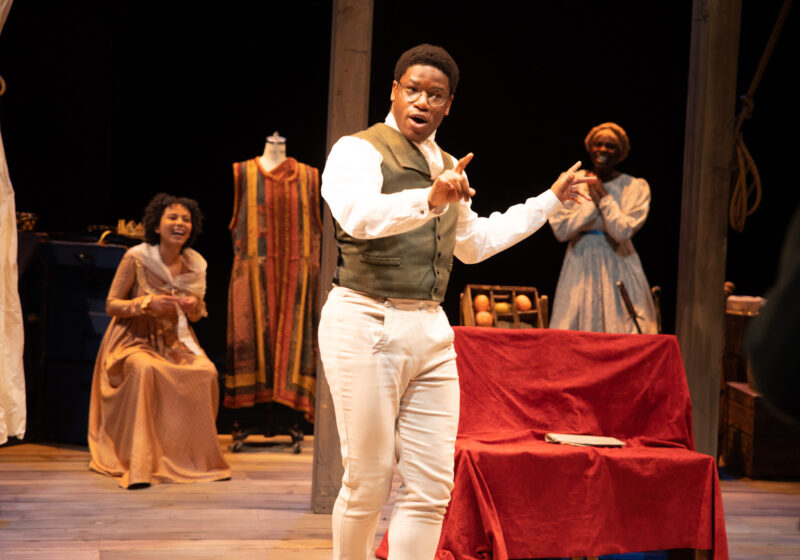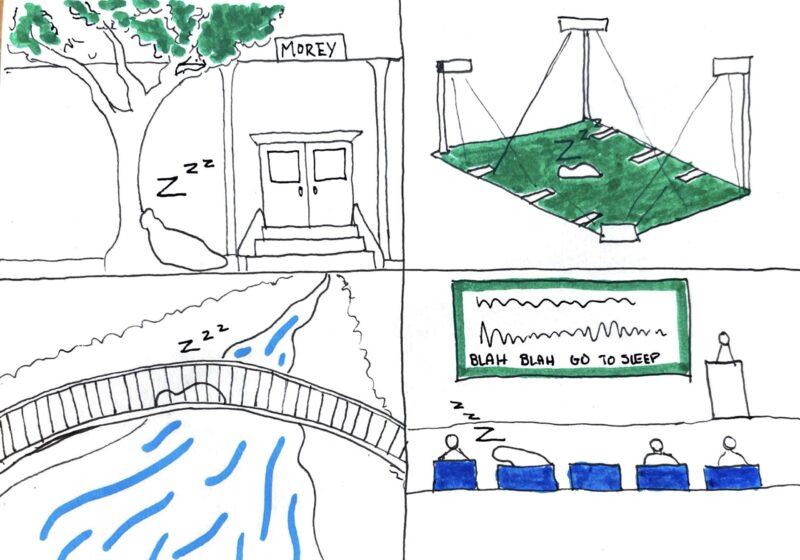In the International Theatre Program’s production of “The African Company Presents Richard III,” there is a heartbeat that underlies the entire performance, from start to finish. Similar to a heartbeat, its rhythm often varies, but it stays present no matter the circumstance. There’s a couple manifestations of these heartbeats throughout the show, and they all aid in the immersive — or detractive — experience you get.
The heartbeat starts with the drums. The drummers in the show — Dance Program lecturer Kerfala “Fana” Bangoura, Sam Welch, first-year Elek Yuhas, Warner graduate student Kaave Hosseini, and AS&E student Sidi Naira — are accompanied by dancers Yaa Adenike and junior Jasmine Joseph, of whom draw your attention the second you catch a glimpse (visually or auditorily) of them. It carries through every beat, given that the drums, loud and full of life, snap you out of every scene and drag you into the next.
Of all the shows I’ve seen through the Theatre Department here, “The African Company” has the biggest highs and lows for investment in its storyline. The blocking in the first act is incredibly engaging, with its start in Todd Union not taking place in the theater, but in the waiting room (with additionally delightful refreshments). Sophomore Gabriel Pierce kicks off the show with an entertaining monologue, referencing the audience as participants, as viewers of the show within the show (the titular Richard III), that was reinforced in immersive value by its staging.
As you filter in near-single file to the theater, you can sit on either side of the stage, and the playbill on your seat is accompanied by a black or white plastic masquerade mask. In hindsight, I wish there had been something in the playbill about the significance of the masks, but alas. Stagings like these, where you are placed in a way that overlooks the action, have this wonderful capacity to draw you in and excitingly redirect your attention in an active way; if someone’s on the stairs next to you, you turn your head; if a character rummages in a box you’re unable to see, you crane your head unthinkingly to see. With the start of the seated portion of the show immediately placing you in a festive mood, it’s easy to want this show to sweep you off your feet.
The set pieces in this section feel lived-in — or, at least, as much as they can while being very deliberately placed. There’s a playing around with the visual effects of dust and salt by characters in the first act that add to this feeling; as they clean, muss up, and dust off their space, you start to live in it as well. I happened to sit in the first row, so during a section in the first act where Sarah (played by senior Smarlin Espino) sweeps as part of the blocking, the lack of dust particles initially jarred me because of how effective it had been for me earlier.
All of the characters in the first act, even with the pacing dragging slightly in sections, are at least entertaining, if not likable. First-years Manita Opoku and Onosejere Ugbenin, both last seen in “The Crucible,” step into big roles and take them in stride, with Opoku’s emotion-filled Ann providing a great contrast to Ugbenin’s one-track-minded Jimmy as they push and pull at each other’s characters in and out of their show. They, alongside senior Cayen Moore as hardheaded patron William Henry (Billy) Brown and Espino’s snappy Sarah, create a group better together than the sum of their parts. Rochester community member Reuben J. Tapp is a highlight of the show with his portrayal of Papa Shakespeare (which just gets even better with time). Even senior Michael Riches’ brutishly villainous constable (and his interaction with the simpering Pierce as white theater owner Stephen Price) has a jaunty little Irish-ish accent and a wide-eyed wonderment for highbrow theater that makes you smirk a bit.
However, that isn’t to say that the first act is without its flaws — in particular, some of the accents feel stilted and hard to chew for the actors, who grapple with characters that live dual lives; as both servants and free men and women. Espino stands out from the rest in this, with her Sarah feeling incredibly natural, as if the words just roll off her tongue. Ugbenin’s dialectic take on Jimmy Hewlett, whether intentional or not, captivated me as well; a man attempting to be taken more seriously as an actor falling in and out of certain rhythmic cadences and pronunciations as he interacts with his compatriots feels right for his character, but not as much for others.
The heartbeat continues out and into the Sloan Performing Arts Center (SPAC) during intermission, and the drums and dancers engage with the audience and urge them to come and dance. It’s fun to watch, and it’s a good way to keep everyone invested while the entire cast and crew shifts over to the new location. The choice to involve both Todd Union and SPAC in the staging is one of stellar ingenuity; if you have these spaces and it makes sense within the show to do so, why not use everything at your arsenal?
The second act automatically forces you into a tone shift; you’re now underneath the performers as they are propped up on stage, and some seats have worse visibility than others — it fits the vibe, but it starts to pull you out of it in ways. In addition, the drummers are now an invisible, behind-the-scenes heartbeat, which doesn’t have as intense an effect as the tension increases between the African Company and Price and the constables. Similarly, some of the story beats that get hit feel less impactful than their buildups in the first act; a weird scene between Ann and Billy Brown totally undercuts the budding passion between Ann and Jimmy, and some of the monologues have less oomph than others in the first act.
The commitment to shutting the African Company down as they put on their Richard III has an intensely topical reference to a modern police brutality event immediately succeeded by some jail doors that get lowered on flies. For such a poignant moment, the staging and blocking choices feel slightly haphazard, and the end doesn’t hit the way I wished it would.
However, the second act has some incredible highs. For one, Tapp’s Papa Shakespeare is downright hilarious, especially when navigating the awkward, brooding tension between Ann and Jimmy. Tapp commands the stage with his stilted, cane-aided gait, and his booming voice in these silly moments warms the soul. In addition, Ugbenin’s monologue about being ridiculed as a Black performer in the second act is so heart-rending. There’s a saying about musicals — if you have too much emotion to speak, you sing — and he sings and hollers through the scene with a sorrowful fury that nearly brings tears to the eyes.
“The African Company” is a labor of love — of passion for its material and commitment to its cause — and just like anything you toil for, the hard work of its cast and crew pays off. It’s clear to see that the effort put in, even when some of it displaces in ways that take you out of the experience, has hearts and souls and a dedicated collective beat behind it.







